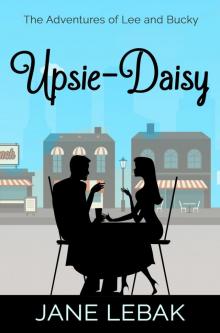- Home
- Jane Lebak
Sacred Cups (Seven Archangels Book 2) Page 9
Sacred Cups (Seven Archangels Book 2) Read online
Page 9
Michael said, “Because we’re a community of friends. That’s one of the things he learned.”
#
Jesus had been alone in Jerusalem four days when Mary rushed through the Temple and found him sitting among a group of teachers. She stood for a moment trying not to scream in frustration, the blood rushing away from her head until she felt faint. He was here. He was safe. All this demonic activity, and here he was all this time, pestering a group of scholars about the meaning of a passage in Isaiah and how it related to a different passage in Ezekiel.
Joseph strode right into the group and grabbed Jesus by the arm, then announced it was time to be leaving.
Jesus’s eyes flew wide as he looked at Joseph’s face, then scanned the courtyard for his mother.
For a moment, Mary wanted to be in that group, wanted to tell Joseph not to be harsh even though a moment ago she had wanted to be the one shouting that he’d done something so terribly irresponsible, so inconsiderate, and when he’d realized he’d been left behind, why hadn’t he done anything to make himself easier to find?
Joseph escorted Jesus over to Mary. “Why did you do this? We’ve been terrified looking for you.”
Jesus swallowed, and then the tears overflowed. “I’m sorry. I thought— I thought you’d know I’d be in my Father’s house!”
Mary grabbed him in a hug and closed her eyes. Jesus wouldn’t be this distressed about upsetting them if he were hurt himself. “Are you okay?” she asked. “Have you been eating? Did you have a place to sleep?”
She looked up to see Raphael, who seemed just as disturbed. Didn’t you hear me calling for you?
He shook his head, projecting a mixture of emotions. Jesus had darted back to the Temple once more before they left, and it had been a demonic attack: he’d gotten distracted by a question, much as Gabriel did when confronted with a tantalizing problem. And Raphael had gotten sucked into it as well, failing to notice the passage of time until the family caravan had departed. At that point it was a question of remaining or trying to find their way by themselves. Raphael could have directed him, but it seemed more prudent to wait. And that night, they’d found Gabriel.
Mary’s eyes widened. You did?
Uriel started. Why didn’t you send word?
The angels communicated too rapidly for Mary to follow, and finally Uriel turned toward Mary. Sometimes God separates us for a short time for a reason.
Communication blackout, Raphael added. Satan must have demanded as much if he approached the Lord for special permission to attack.
Mary swallowed her protest that this explanation wasn’t good enough: first God didn’t tell them where to find Gabriel, and then God didn’t let them tell one another he’d been found, nor where Jesus was.
Jesus wiped the tears from his flushed cheeks. “I’m sorry, Mom. I really didn’t mean to worry you. And I was okay the whole time. I kept coming back to the Temple every day, but we must have kept missing each other.”
Demonic attack. Demons could rearrange crowds and distractions and maybe it was enough to keep people from finding other people. At least for a while. Mary took a deep breath.
One of the priests touched Joseph on the arm and assured him the boy would be a great rabbi when he grew up. Mary only looked at Jesus and tried to feel thankful that he was with her again, or maybe pride that so many intelligent and holy men recognized his own intelligence and holiness, but instead she felt only the resentment of all the worry.
They started for home immediately, Mary worrying about not having enough supplies but realizing when they stopped for the night that her extra allocation, in case they’d meet someone in need, would see them through.
While Joseph tended the animals, Jesus walked off alone. Mary noticed him an arrow-flight from the camp. Still skittish, Mary called, but he didn’t hear, so she followed.
As she drew closer, he asked for Gabriel.
Mary hadn’t seen Gabriel yet, so it frightened her to find wariness in his eyes, the way he looked so reserved while talking to Jesus. Before this trip she would have expected to find him wearing an easy smile, maybe head off whatever Jesus was going to say by asking if he wanted a math lesson. Now he looked like nothing more than a soldier reporting to his commanding officer.
How badly had he been hurt? How much did he blame her?
She heard Jesus say, “I overstepped my boundaries with you.”
Gabriel opened his hands, and she couldn’t read everything Gabriel said. She continued moving closer, not wanting to eavesdrop and knowing they would stop as soon as they saw her if they didn’t want her to overhear.
Gabriel looked at her, then back at Jesus.
Jesus said, “I know you’re not upset. But even so, I was asking you things I shouldn’t.”
Again Gabriel opened his hands, and this time he bowed his head as well. Mary caught some of what he projected this time: the answers were his right, and he also had the right to demand them if he wanted.
Jesus said, “But I’m not going to.” Then he turned and saw his mother. “I’ll come back in a minute. I hurt your feelings before, and I realized when we were traveling, I must have hurt Gabriel’s too.”
Mary took a step backward, but Gabriel indicated she could stay. He projected a question to Jesus.
“Yes, one more thing.” Jesus lowered his gaze. “When I showed you those figures, I realize it made you uncomfortable, but I want you to know…” He tried to meet Gabriel’s eyes, but although Gabriel was looking right at him, he didn’t seem able to do it. “I want you to know, God loves all four of them. All three figures in my hands. He had a special care for the second one. The one you called the zeroth figure he loves especially. And the final one, the one you showed me, if that was the only one left, he would be heartbroken, but he would love that one too.”
Gabriel took a step backward, confusion swirling around him. Mary moved closer as if to steady him.
Jesus looked up. “That was all I wanted to say. I’m sorry I upset you.”
Gabriel bowed, and then he kissed Jesus on the forehead.
“Wait,” Mary said, “don’t go yet.”
Smiling, Gabriel turned to her. “I hope you’re not going to offer me another cup of wine.”
Mary reached her hand toward him, and he brushed his wingtips through her fingers. “I’m sorry I caused so much trouble.”
Gabriel shrugged. “I’m not going to blow the roof off your house.”
“Smiling or unsmiling?”
“Either way.”
“I’m sorry you got hurt because of me.”
“Technically speaking,” Gabriel said, “I got hurt because of Satan, and because I was protecting Jesus, and because I wasn’t clever enough to spot an ambush in advance. I hold you responsible for none of that.”
Mary lowered her head. “Thank you.”
“Thank you for keeping up the pretense as long as you did.”
Mary gave an amused smile. “It’s been satisfactory.”
“Glad to hear it,” Gabriel said, and with that he vanished.
Jesus came toward his mother. “I’m sorry I worried you. I needed to take care of that.”
“It’s okay,” Mary said, seeing Raphael leaning against a tree with a smile on his lips. “I think you just did something very important. Very adult.”
Jesus took her hand, and they walked back to the campsite.
Seven
Year Eighteen
“Raphael!”
Mary’s voice in Raphael’s mind was so urgent that Jesus dropped his hammer and looked right at him.
Mary, what’s happening?
“It’s Joseph. Come now. Right now!”
Gabriel already vanished, and in an instant he returned. “Joseph is ill. You’re needed.”
Jesus left the worksite and bolted for home. When he was out of sight of the other workers, though, Raphael said, “Stop. Wait,” and grabbed his hand. “Close your eyes. Okay, now open them.”
When
Jesus looked up again, Raphael had transported them both to an alcove within Nazareth. Jesus got his bearings and pelted for the house.
Just inside, he ran through Gabriel in the doorway and pulled up short beside Mary. She was crouching beside Joseph, collapsed on the floor. “Help him up. Something’s wrong and I don’t know what.”
Raphael laid a hand on Joseph’s head and moved with him as Jesus gathered him up, then laid him out on his bed. What are you getting from him? Jesus asked Raphael.
Raphael kept his focus on the blood flow through the man’s body, the rhythm of his heartbeat, his shallow breaths, the unsteady and tiny blips like lightning flashes in his brain. Gabriel fed him energy, but energy wasn’t what Raphael needed. What he needed was permission, and none came. Jesus could give the command and he’d heal Joseph in an instant. For that matter, Jesus could heal Joseph himself, something he was praying for permission to do right now.
Mary looked at Jesus. “Will you do anything for him?”
Will. Not can.
Raphael waited. Jesus brushed the hair from Joseph’s forehead and settled him. Joseph never stirred, only kept breathing lightly.
Is that a brain bleed? Gabriel asked.
Raphael acknowledged. He’s not in any pain. But he’s not going to recover unless we intervene.
Gabriel said nothing. He knew the rules as well as Raphael did, but Raphael could feel him praying. He could feel Uriel channeling and delivering Mary’s prayer, even if her prayer didn’t take the form of words as much as tears.
Jesus too was praying, waiting. And as Mary looked to him, Raphael felt a chalky darkness fall through the house. Asmodeus.
Raphael reached for his sword, but God stilled him. A test, then. It had to be permitted.
Asmodeus’ touch permeated the prayer. Wasn’t Joseph a good man? A man chosen specially to be Jesus’s father? And if Jesus had power, didn’t it stand to reason he ought to use it in order to help good men?
Jesus kept praying, but Raphael felt a curious doubling happen to the prayer: there was Jesus’s own prayer and then an anharmonic resonance with a prayer that wasn’t his own and yet felt as if it could be. What would Mary do without her husband? Who would care for her? If Jesus had a role to fill, who would provide for her in his absence? Life was hard for a widow. She needed Joseph so Jesus could be free to fulfill whatever God wanted.
Raphael bristled, but Jesus’s prayers did turn toward that avenue: for Mary’s sake, he was asking the Father, please bring healing to Joseph. And for his own – he still needed guidance.
No permission. Only silence.
Asmodeus raised a thought: whatever wasn’t forbidden must be permissible. Healing was good. God was good. Healing would be a work of God. It was time to act.
Jesus closed his eyes.
Mary stroked Joseph’s hand. “I’m sorry,” she whispered, either to Jesus or to Joseph or to both. “I’m sorry.”
Jesus leaned forward and breathed over Joseph, but Raphael didn’t feel him reaching out the way he’d reached out for Gabriel. Nothing like, Dad, be whole. Instead it was more a blessing, a farewell, a wish.
Asmodeus retreated. Raphael sat at the head of the bed with Jesus and remained close until Joseph died. He remained close as Jesus tended the body for burial, and he remained close during the next morning as Jesus shuffled through a fog of grief.
When the sun rose, Mary approached Jesus holding a leather bag. “Take these.” Tears glistened in her bloodshot eyes. “They belong to you now.”
Jesus accepted the bag, and he headed to the work site.
Dad’s tools, he thought to Raphael. They made a familiar sound as they clanked against one another in the bag slung over his shoulder. The bag bore Joseph’s sweat, his hand marks, everything he’d worked with on an everyday basis. He made so many buildings and pieces of furniture and carts. That was his life, and now I have his work left to do.
At the work site, Jesus reported to the foreman and apologized for leaving but that he’d gotten a message his father was dying. The foreman said he wouldn’t be paid for yesterday and sent Jesus out to build a staircase.
He used Joseph’s tools. Tools where the flaws were worn down into a part of the instrument, every shortcoming known and every good feature appreciated. In the evening, the foreman paid him for a staircase and sent him home.
Jesus hadn’t spoken to Raphael all day, and Raphael had been busy deflecting attacks: guilt that Jesus had let down his mother, plus guilt that he’d stayed his hand and not tried to force a healing or not tried to force God to relent. There was a sense of self-indulgence at his own sadness: why be sad when he’d chosen to let Joseph die? And finally discouragement because he wasn’t as good a carpenter at age eighteen as Joseph had been at sixty.
Raphael kept sending reassurance: Jesus had done what he was permitted, and that was right.
As the sun dipped over the road, Jesus rounded a bend to find a lone Roman soldier. “You, there!” The soldier pointed at Jesus. “Carry my gear!”
Raphael bristled, but that was the law: a Roman soldier could conscript a man to carry his gear one mile. Jesus, exhausted from the day’s work, sighed, but the Roman thrust him his shield and a pack. “Take those.”
Jesus shifted Joseph’s work bag so he could heft the additional load. The Roman said, “This way.”
They headed back up the road the way they’d come, and Jesus sent word to Gabriel to tell Mary he’d be home after dark. The Roman said nothing, but Jesus kept looking at him. Finally Jesus said, “Are you injured?”
The Roman glared at him. “Just carry my gear.”
Jesus handed him the waterskin. “Well, regardless, you look thirsty. Here.”
The Roman said, “Are you trying to trick me?”
Jesus said, “It’s water. You’re thirsty. Drink.”
The Roman took the waterskin and drank, then tilted it up and gulped down the whole thing. He gasped, wiping water from his cheeks, then handed the skin back to Jesus.
It grew dark. Jesus said, “Are you stationed in Caparnum?”
The soldier grunted an agreement.
“You got separated from your platoon?”
“I was sent to deliver a message.”
Jesus smiled. “Some of my best friends are messengers.”
The Roman’s voice grew tight. “Well, maybe they know the roads around here better than I do. All your towns look the same, so how was I supposed to find the right way to go?”
Jesus said, “Oh, you got lost. That’s why you ran out of water.”
The Roman said, “How did you know that?”
Jesus raised the empty waterskin. “Your own is empty, and you finished off mine. People aren’t overly friendly to Romans, no? You got directed all over the place by the least likely routes. Well, this will get you to Caparnum, and you’ll be back with your centurion.”
The Roman said, “Are you some kind of rabbi?”
Jesus patted the work bag. “I’m some kind of carpenter.”
Nothing more for a while. Jesus looked tired, but not as tired as the soldier. Jesus said, “Your tools weigh a lot more than mine do.”
A huff from the soldier. “Because I have to do a lot more than you do.”
Jesus said, “Oh, come on. My tools make houses.”
The soldier said, “My tools make empires.”
Jesus drew a sharp breath, and he looked up for Raphael, who moved around front of the walkers.
My father’s tools, Jesus thought to him. They’re carpenter’s tools. And this soldier is using his tools to make…well, war and obedience and safety. But what about my real Father’s tools?
In this moment, Jesus reminded him so much of Gabriel enmeshed in a problem, although Jesus could cast the whole question in an emotional and spiritual light that Gabriel at his best never achieved. Jesus kept thinking out loud to him, but the words faded and the thoughts became a series of impulses, so rather than answer, Raphael sent encouragement.
My Father’s tools are mercy. And patience. Love. Anger. Redirection. Jesus shook his head. Water. Manna. Wine. Words. Humans. Touches.
Jesus picked up speed and tucked his head as he walked, and the Roman unconsciously increased his pace to keep up with him.
What can I make with those tools? Jesus half-thought, half-prayed, and Raphael kept himself out of the prayer because he could feel the Spirit interacting with Jesus: what better guide was there? You make an empire with swords. You make a house with hammers and an adz and a bow-drill. But what do you make with mercy, love, the law, and the word? What do you craft with souls?
Raphael limited his work to guiding Jesus’s steps, keeping him from stumbling under the weight of the Roman's gear as well as his own and the new gear he was picking up in his mind. What did God use to create history? Time. Justice. Mercy. Good will. But more than that: God used mistakes as well. God used stubbornness. The more Jesus thought, the more Raphael realized God used everything. Everything – maybe God had even used his own abandonment of Gabriel during that wretched punishment.
Jesus's thoughts inverted the problem, a technique for which he could probably thank Gabriel: was there anything God didn't use? Lies? Well, God didn't use lies of His own, but He'd used Joseph's brothers' lies to bring the people down to Egypt. He'd used Pharaoh's hard-heartedness to bring the people out again. He'd used the destruction of the Temple itself to bring about pure monotheism and end idolatry forever.
Is there anything so wretched and brutal that the Father can't use it? Jesus thought to Raphael.
Raphael sent back, Can you come up with anything?
Disobedience: used. Adultery: used. No, actually, these things weren’t used as much as converted. Weakness. Despair, Jesus thought. I don't think despair is of much use to the Father because despair itself prevents its own usefulness.
He kept thinking. Physical pain. But maybe it teaches the one on the receiving end? Or maybe the ones helping? More walking, more of him reaching into Raphael's power to pull on his reserves, and Raphael gave it all. The Spirit bore a crackling energy now, like a mother offering milk to a hungry baby, and Jesus's spirit was drinking it in.
The Maccabeans certainly died heroically. That mother and all her sons. That was a cruelty God used to inspire others. If evil itself can become a tool in the hands of God, then what remains? Everything is in His workbag.

 Bulletproof Vestments
Bulletproof Vestments The Wrong Enemy
The Wrong Enemy The Boys Upstairs (Father Jay Book 2)
The Boys Upstairs (Father Jay Book 2) Sacred Cups (Seven Archangels Book 2)
Sacred Cups (Seven Archangels Book 2) Bulletproof Vestments: A Father Jay Story
Bulletproof Vestments: A Father Jay Story An Arrow In Flight (Seven Archangels Book 1)
An Arrow In Flight (Seven Archangels Book 1) Upsie-Daisy
Upsie-Daisy Shattered Walls (Seven Archangels Book 3)
Shattered Walls (Seven Archangels Book 3) Pickup Notes
Pickup Notes